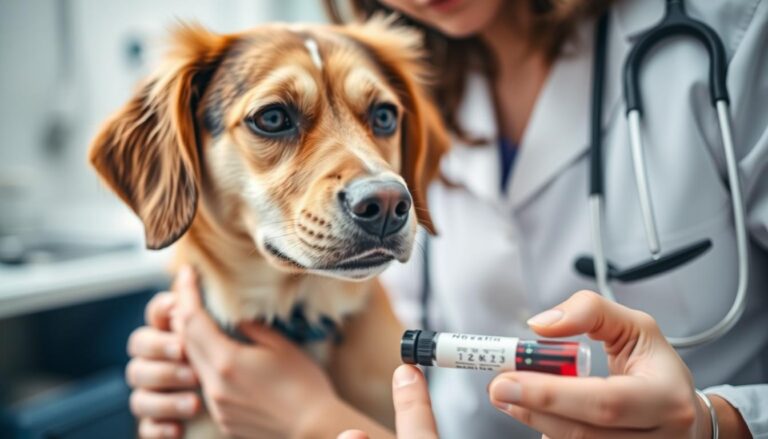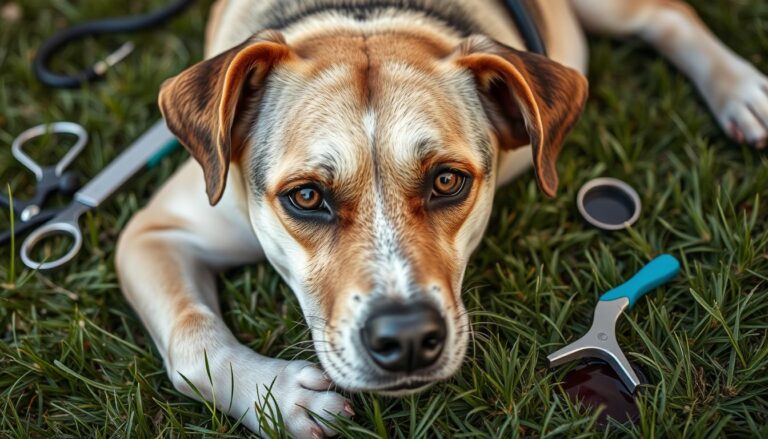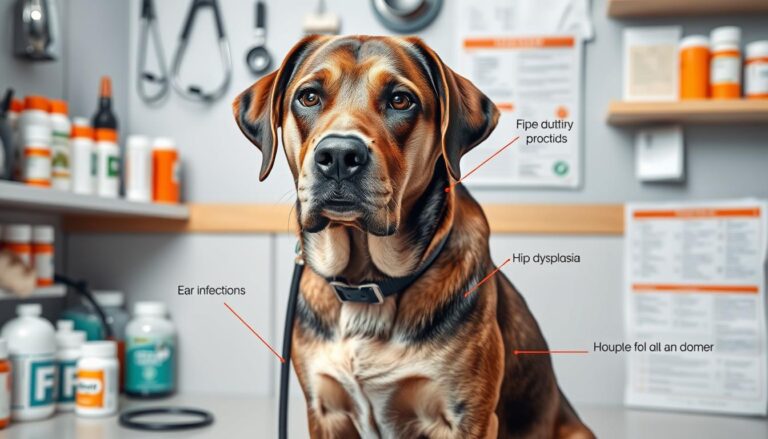Common Catahoula Leopard Dog Health Issues & Care Guide
Common Catahoula Leopard Dog Health Issues : As a Catahoula Leopard Dog owner, knowing about their health is key. These dogs are known for their unique looks. But, they need special care to stay healthy. This guide will cover common health problems, how to prevent them, and how to treat them.
Table of Contents
Key Takeaways
- Catahoula Leopard Dogs face health issues like hip dysplasia, eye problems, and deafness.
- Preventive care, early detection, and management are vital for their health and happiness.
- Knowing their genetic risks and regular vet visits can help manage health problems early.
- Meeting their exercise and mental needs is important for their physical and emotional health.
- Managing skin allergies and coat care is essential for their comfort and looks.
Understanding Your Catahoula Leopard Dog’s General Health Profile
As a Catahoula Leopard Dog owner, knowing your pet’s health is key. This breed is known for its unique look and lively spirit. But, it also has health issues that you should watch out for.
Breed-Specific Health Predispositions
Catahoula Leopard Dogs face health problems like hip and elbow dysplasia, eye issues, and deafness. These conditions can really affect your dog’s life. So, it’s important to know about them and take steps to manage or prevent them.
Lifespan and Quality of Life Factors
Catahoula Leopard Dogs usually live between 10 to 14 years. But, their life quality depends on diet, exercise, and quick medical care for health problems. With the right care and vet visits, your Catahoula can live a long, healthy life.
Genetic Health Testing Recommendations
Genetic health testing is a smart way to tackle catahoula leopard dog health issues. It can spot genetic problems early, helping you act fast. Working with your vet, you can give your Catahoula the care it needs.
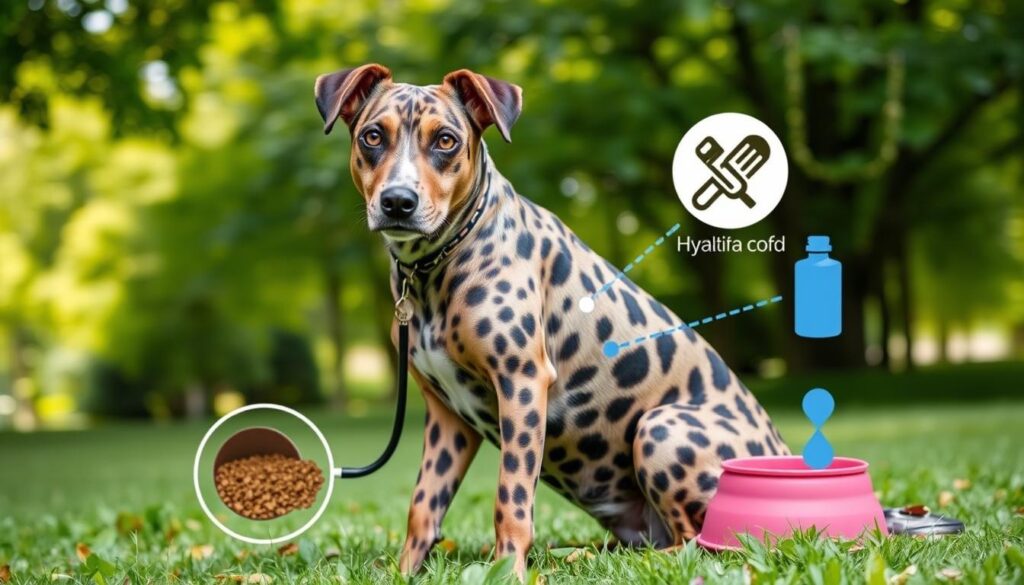
Being informed and proactive about your Catahoula’s health is crucial. Knowing the breed’s health concerns and using genetic testing helps. This way, you can give your pet the care it deserves for a happy, healthy life.
Common Catahoula Leopard Dog Health Issues
As a proud Catahoula Leopard Dog owner, it’s key to know about common health issues. These active and loyal breeds face several conditions. They need careful monitoring and early care.
Hip dysplasia is a big concern for Catahoula Leopard Dogs. It causes painful joints and can limit their movement. Regular vet visits and early detection are vital to keep your dog happy and healthy.
Another issue is deafness. Catahoula Leopard Dogs often have hearing loss from birth. This makes it hard for them to hear commands and stay safe. They need special training and help to adapt.
Catahoula Leopard Dogs also face eye problems like cataracts and corneal dystrophy. Regular eye checks and treatment are crucial. They help keep your dog’s vision clear and prevent more issues.
| Health Issue | Prevalence in Catahoula Leopard Dogs | Potential Impact |
|---|---|---|
| Hip Dysplasia | Relatively Common | Painful joint problems, mobility challenges |
| Deafness | Relatively High | Impaired ability to respond to commands, safety concerns |
| Eye Problems | Relatively Common | Vision loss, corneal issues, and other complications |
Knowing about these health issues and acting early can help your Catahoula Leopard Dog live a long, healthy life. Regular vet visits, early action, and special care plans are key. They help keep these amazing dogs happy and healthy.
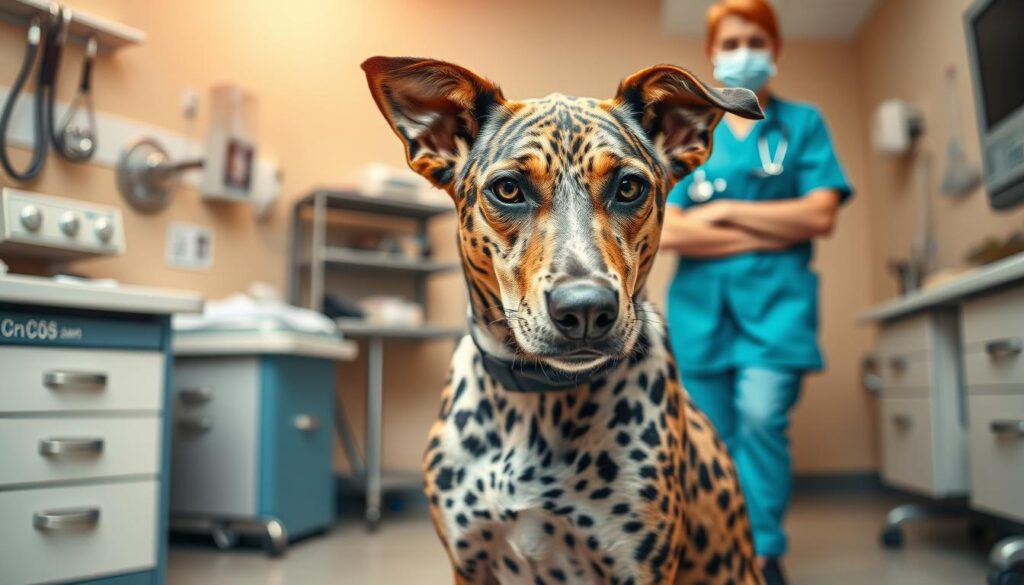
Hip Dysplasia and Joint Problems
If you own a Catahoula Leopard Dog, knowing about joint issues is important. Hip dysplasia is a big concern. It can really affect your dog’s life. So, finding problems early and taking action is crucial.
Early Detection Signs
Watch for these signs of hip dysplasia and joint issues in your Catahoula Leopard Dog:
- Difficulty standing up or lying down
- Reluctance to exercise or play
- Stiffness or lameness in the hind legs
- Pain or discomfort when the hips are manipulated
Treatment Options and Management
If your Catahoula Leopard Dog has hip dysplasia or joint problems, the vet might suggest:
- Medication – Anti-inflammatory drugs, pain relievers, or joint supplements to manage pain and inflammation
- Physical Therapy – Exercises and activities to improve joint mobility and muscle strength
- Surgery – In severe cases, surgical interventions like hip replacement or other procedures to improve joint function
Prevention Strategies
While some joint problems are genetic, you can take steps to prevent or lessen them:
| Strategy | Description |
|---|---|
| Maintain a Healthy Weight | Ensure your Catahoula Leopard Dog maintains an optimal body weight to reduce stress on their joints. |
| Provide Appropriate Exercise | Engage your pup in low-impact activities like swimming, hiking, and short, controlled playtime to build muscle strength without overexerting their joints. |
| Consider Genetic Screening | Work with your veterinarian to determine if genetic testing for joint disorders is recommended for your Catahoula Leopard Dog. |
By being vigilant, providing the right care, and consulting with your vet, you can help your Catahoula Leopard Dog stay healthy. This way, they can enjoy a happy, active life.
Hereditary Eye Conditions and Vision Care
If you own a Catahoula Leopard Dog, knowing about eye problems is key. These dogs can get several hereditary conditions that harm their vision and eye health.
Progressive Retinal Atrophy (PRA) is a big issue for Catahoulas. It causes vision loss over time. It’s vital to get regular vision care and catch it early.
Catahoulas can also get cataracts, glaucoma, and other eye issues. Regular eye exams by a vet can spot these problems early. This helps in finding the right treatment.
- Keep up with eye care with yearly check-ups and watch for signs
- Look out for signs like too much blinking, squinting, or trouble moving around
- Work with your vet to manage hereditary eye conditions and find the best care
By focusing on vision care and watching your Catahoula’s eyes, you can help them see better. Preventive steps and quick treatment are crucial for their health.
Deafness and Hearing-Related Concerns
Deafness is common in Catahoula Leopard Dogs. It’s key for owners to know about hearing loss types and how to care for deaf dogs. This section will cover deafness types, diagnosis, and tips for living with a deaf Catahoula.
Types of Hearing Loss
Catahoula Leopard Dogs can have two main hearing loss types: conductive and sensorineural. Conductive loss happens when the outer or middle ear has a problem. This stops sound waves from getting to the inner ear.
On the other hand, sensorineural loss is due to damage in the inner ear or auditory nerve. It makes it hard for the dog to understand sound signals.
Testing and Diagnosis
It’s important to find out the type and how bad hearing loss is in a Catahoula. Vets use tests like the brainstem auditory evoked response (BAER) test. This test checks how the brain reacts to sound without hurting the dog.
Living with a Deaf Catahoula
Deaf Catahoula Leopard Dogs need some special care, but they can be very happy. Owners should use visual cues, touch, and vibrations to communicate. A safe, predictable place and special training can also help a lot.
With the right support, a deaf Catahoula Leopard Dog can be a loving family member. They can thrive and enjoy life.
Skin Allergies and Coat Management
If you own a Catahoula Leopard Dog, you might face skin allergies. These dogs often get skin conditions that affect their health. Taking good care of their coat and grooming is key to handling these issues and keeping their coat looking great.
Environmental allergies are a big problem for Catahoulas. They can cause a lot of itching, hot spots, and skin irritation. Finding out what’s causing the allergy and getting a treatment plan from your vet is crucial.
- Common environmental allergens for Catahoulas include pollen, dust mites, and certain grasses.
- Your vet may recommend hypoallergenic shampoos, medicated topicals, or even immunotherapy to help manage your pup’s skin sensitivities.
Keeping your Catahoula’s coat in good shape is also vital. They have a thick, double coat that needs regular care to avoid mats, tangles, and skin problems.
| Grooming Recommendation | Frequency |
|---|---|
| Brushing | 2-3 times per week |
| Bathing | Every 4-6 weeks |
| Nail Trimming | Every 4-6 weeks |
| Ear Cleaning | Monthly |
By focusing on your Catahoula’s coat care and treating skin allergies quickly, you can keep their skin and coat healthy and shiny for a long time.
Exercise Requirements and Physical Health
Catahoula Leopard Dogs are full of energy and need lots of exercise. This keeps them healthy and happy. It’s important to give them the right kind and amount of exercise to avoid injuries.
Daily Exercise Needs
Catahoulas need at least 60 minutes of exercise every day. This can be walks, playtime, or activities like fetch. Without enough exercise, they might get behavioral problems, become overweight, or have health issues.
Activity Recommendations by Age
- Puppies (up to 1 year): Short, frequent sessions that are fun and light to protect their joints.
- Adult Dogs (1-7 years): They need lots of varied exercise for at least 60 minutes a day, like running or swimming.
- Senior Dogs (8+ years): They should do moderate, easy exercises to keep their muscles and joints healthy.
Injury Prevention During Exercise
To avoid injuries, start slowly and warm them up well. Then, cool them down afterwards. Stay away from hard surfaces and use protective gear like paw wax. Always talk to your vet to make sure your Catahoula is getting the right exercise.
“Keeping your Catahoula Leopard Dog physically active is not only crucial for their health but also helps to prevent behavioral issues and strengthen the bond between you and your canine companion.”
Mental Health and Behavioral Considerations
As a Catahoula Leopard Dog owner, it’s key to think about your dog’s mental health and behavior. These smart and lively dogs need mental challenges to avoid separation anxiety and behavioral issues.
Separation anxiety is common in Catahoulas because they bond strongly with their families. Give them lots of mental stimulation through training, puzzle toys, and fun play. Teach them new tricks and consider classes to keep their energy positive.
- Make sure your Catahoula gets enough daily exercise.
- Give them different chew toys, puzzle feeders, and games to keep their minds sharp.
- Help them get used to being alone by starting with short times and slowly increasing it.
Catahoula Leopard Dogs might also face other behavioral issues if their needs aren’t met. It’s important to train them consistently, socialize them, and keep their environment interesting. This helps keep their minds healthy and prevents bad behavior.
| Behavioral Concern | Potential Causes | Recommended Solutions |
|---|---|---|
| Excessive barking | Boredom, lack of exercise, anxiety | Increase daily exercise, provide mental stimulation, consider anti-bark training |
| Destructive chewing | Teething, boredom, anxiety | Give them the right chew toys, play more, crate them when alone |
| Hyperactivity | High energy breed, lack of exercise | Make sure they get enough exercise, give them ways to use their herding instincts |
By focusing on your Catahoula’s mental health and behavior, you can have a happy, well-adjusted pet. With proper care, these smart dogs can be loyal and loving family members.
Conclusion
The Catahoula Leopard Dog is a special breed that needs careful health management. They face issues like hip and joint problems, eye conditions, and hearing issues. Knowing these health challenges is key to giving them a great life.
Regular vet visits, early detection, and preventive care are vital. By understanding their breed-specific health needs, you can help them stay healthy. This includes genetic tests, proper exercise, and grooming.
Even though Catahoulas are resilient, they need dedicated care. By focusing on their health, you can enjoy their energy, loyalty, and beauty. They make wonderful companions.
FAQ
What are the most common health issues in Catahoula Leopard Dogs?
Catahoula Leopard Dogs often face health problems like hip dysplasia and deafness. They can also have eye issues, skin allergies, and bloat. Other concerns include separation anxiety and needing lots of exercise.
How can I detect and manage hip dysplasia in my Catahoula Leopard Dog?
Spotting hip dysplasia early is crucial. Watch for signs like trouble getting up and avoiding exercise. Pain or stiffness in the hips is a red flag.
Treatment includes managing weight, using meds, and physical therapy. In serious cases, surgery might be needed. Keeping your dog at a healthy weight and exercising them gently can help prevent joint issues.
What are the common eye conditions that affect Catahoula Leopard Dogs?
Catahoula Leopard Dogs are at risk for eye problems like progressive retinal atrophy and cataracts. Regular eye checks are key. Early detection and treatment are vital to keep their vision sharp.
How can I manage deafness in my Catahoula Leopard Dog?
Deafness is common in Catahoulas. If your dog is deaf, use visual cues and vibrations for communication. Positive reinforcement training is essential.
Creating a safe space and avoiding sudden noises is also important. This helps your deaf Catahoula feel secure and happy.
How can I address skin allergies in my Catahoula Leopard Dog?
Skin allergies are common in Catahoulas. Find out what triggers their allergies and avoid it. A good diet and medicated shampoos can help.
Regular grooming and baths are also key. They keep your Catahoula’s coat and skin healthy.
What are the exercise needs of a Catahoula Leopard Dog?
Catahoula Leopard Dogs need lots of exercise. They should get at least 60 minutes of active play each day. This can be running, hiking, or playing fetch.
They need both physical and mental stimulation. This keeps them happy and prevents problems like separation anxiety.
How can I address separation anxiety in my Catahoula Leopard Dog?
Catahoulas can get anxious when left alone. They bond strongly with their owners. Gradual training and mental games can help.
Make sure they get enough exercise and have a calm place to relax when you’re away. Avoid making their anxiety worse.


